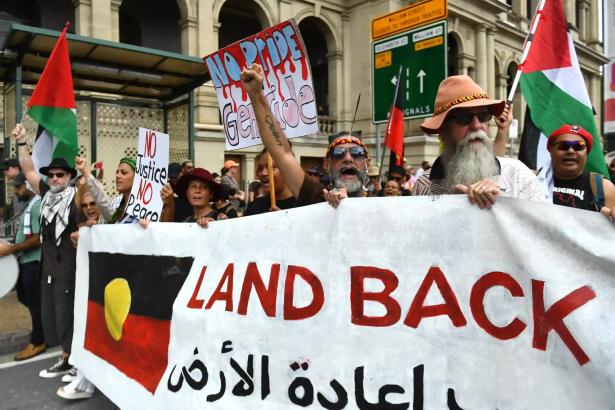- In an Age of Mass Protest, Why Aren’t We Winning?
- Strikes and More Strikes
- Ukraine’s Sotsialnyi Rukh on Palestine’s Fight
- Elections 2024: Pakistan, Indonesia, India, Ireland
- Stormy Germany
- Namibia’s President, SWAPO Founder and Reformer, Dies at 82
- Myanmar Resistance: Tough Questions
- Kenya and Haiti
- Protests on Australia’s Invasion Day
- Walter Rodney’s Marxism
__________
In an Age of Mass Protest, Why Aren’t We Winning?
Mike Phipps / Labour Hub (London)
From 2010 to 2020, more people took part in protests than at any other time in human history – the Arab Spring, student direct action in Chile, democracy activism in Hong Kong and Ukraine, to name a few. Why, asks Bevins, has success proved so elusive, in many cases the outcome being the opposite of what the protesters wanted?
__________
Strikes and More Strikes
- Argentina Zoe Alexandra / Peoples Dispatch (New Delhi)
- Northern Ireland Phil Hearse / Anti*Capitalist Resistance (London)
- Finland AFP News / Yahoo! (Sunnyvale CA)
- UK Erika Page / The Christian Science Monitor (Boston)
- Nigeria Obiora Ikoku / Waging Nonviolence (Brooklyn)
__________
Ukraine’s Sotsialnyi Rukh on Palestine’s Fight
Sotsialnyi Rukh / Links (Sydney)
For well-known Hamas partners and sponsors, such as the authoritarian authorities of Qatar, Turkey, Iran, Saudi Arabia, or Russia, the tragedy of the Palestinian people is only a bargaining chip. But reducing the Palestinians to “proxies of Tehran and the Kremlin” in the domestic information space is as much a caricature as the “proxy” justification of Russian aggression against Ukraine.
__________
Elections 2024
- Pakistan Dr Amar Ali Jan / Haqooq-e-Khalq Party (Lahore)
- Indonesia Johannes Nugroho / South China Morning Post (Hong Kong)
- India Nidhi Sharma / The Economic Times (Mumbai)
- Ireland Rory Carroll / The Guardian (London)
__________
Stormy Germany
- Anti-Fascist Protests Continue [use translation app] Peter Nowak and Jana Frielinghaus / Neues Deutschland (Berlin)
- Anti-Fascism, Gaza and War Guilt Simsim Abdo / Al Jazeera (Doha)
- After Die Linke Split Carsten Braband and Mario Candeias / Rosa Luxemburg Stiftung (Berlin)
- Labor Upsurge Ben Knight / Deutsche Welle (Berlin)
__________
Namibia’s President, SWAPO Founder and Reformer, Dies at 82
Henning Melber / The Conversation (Waltham MA)
Swapo’s candidate Hage Geingob was elected as Namibia’s president for 2015 to 2020. In 2017 he became party president. As head of state with far reaching executive powers, he remained in control over party and government since then. He elevated Namibia into the league of countries with the highest proportion of women in leading political offices.
__________
Myanmar Resistance: Tough Questions
Nyan Lin / The Irawaddy (Yangon)
Staging an armed revolution requires well-articulated objectives and a sound strategy. Support from local people also matters. Fought by spirited and energetic young people, the revolution has made remarkable progress. But for success, an armed revolution must come under a single command or headquarters. The resistance government’s Ministry of Defense has achieved little success so far.
__________
Kenya and Haiti
Pavan Kulkarni / Peoples Dispatch
Despite the prohibition by Kenya’s High Court, President William Ruto has vowed to deploy policemen within this week to Haiti. Communist Party of Kenya leader Booker Omole says Ruto is selling the country’s foreign policy to the highest bidder, namely the US.
__________
Indigenous Protests on Australia’s Invasion Day
Caitlin Cassidy, Henry Belot and Andrew Messenger / The Guardian
The speeches in major capital cities highlighted anger and despair over high incarceration rates, ongoing deaths in custody and the forced removal of First Nations children from their families. The rallies come just months after the proposal for an Indigenous voice to parliament was overwhelmingly defeated at the referendum.
__________
Walter Rodney’s Marxism
Shozab Raza and Noaman G. Ali / Boston Review
Rodney was among the midcentury thinkers deeply influenced by Marxism who argued that formal independence from colonial powers did not entail actual emancipation. Instead, it led to a “neocolonial” order in which a country’s “economic system and thus its political policy is directed from outside,” as independent Ghana’s first leader, Kwame Nkrumah, put it in 1965.


Spread the word